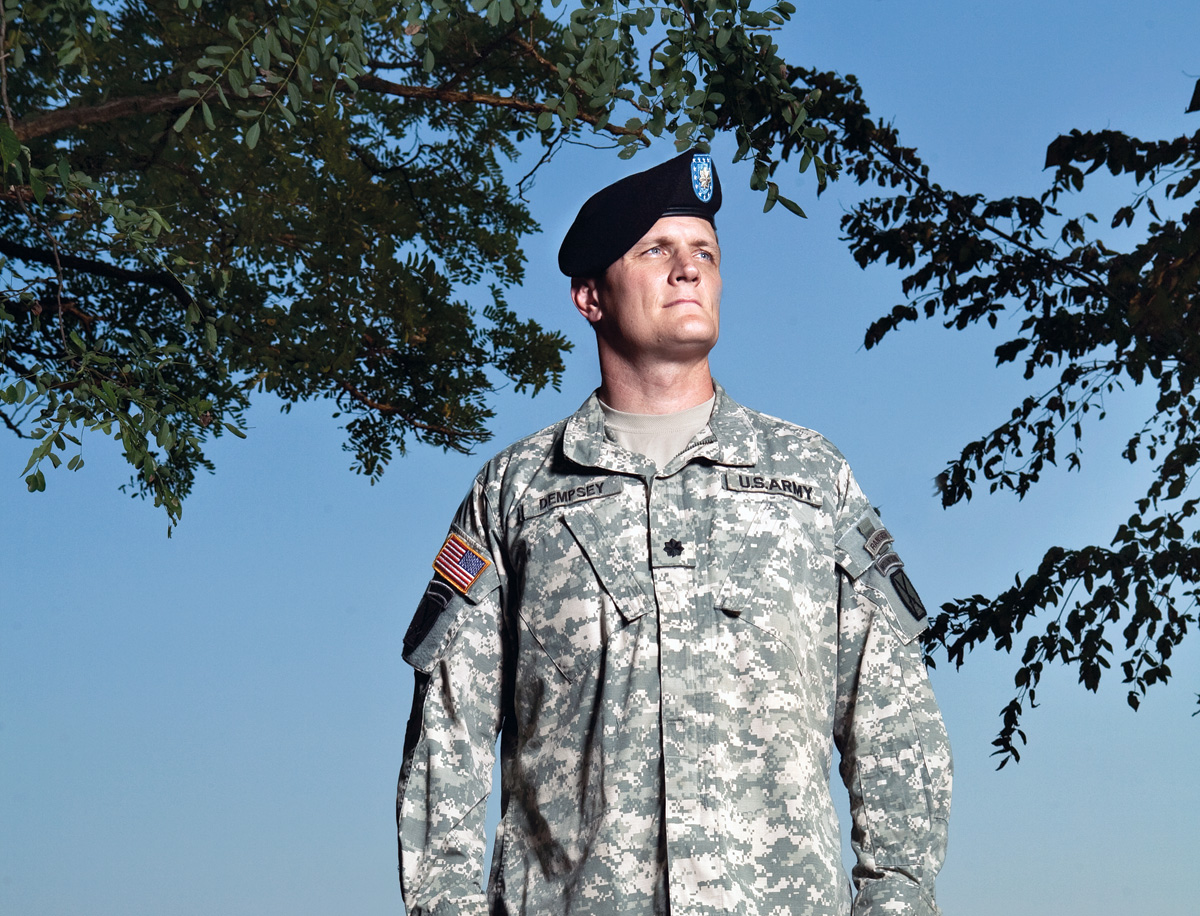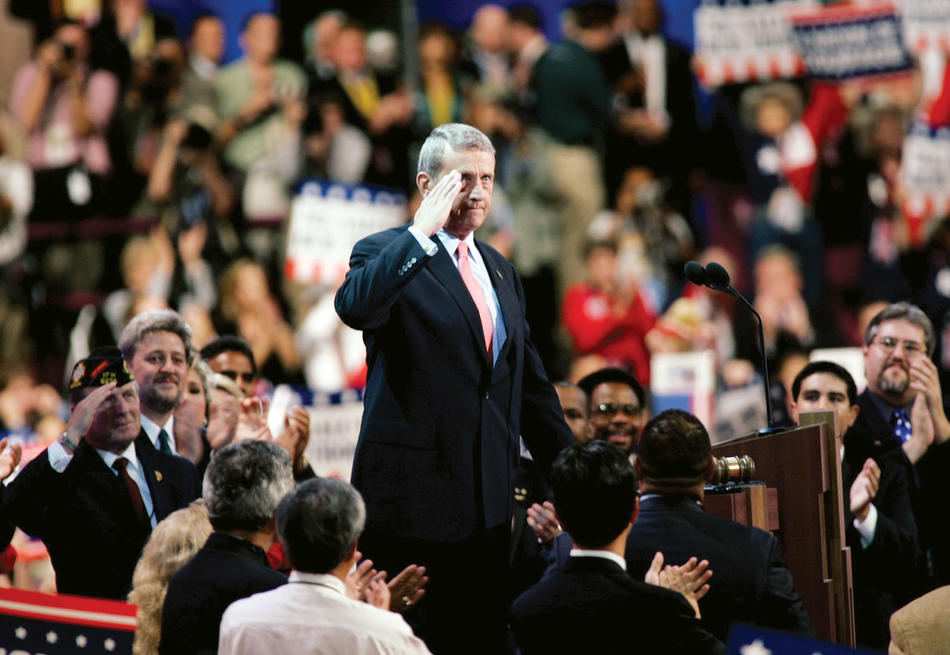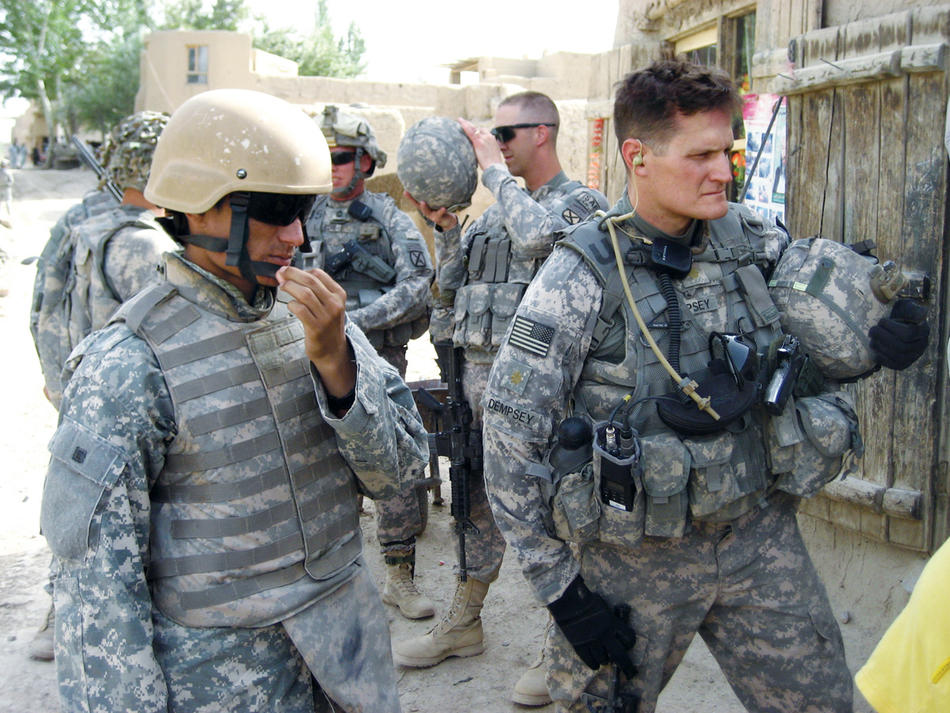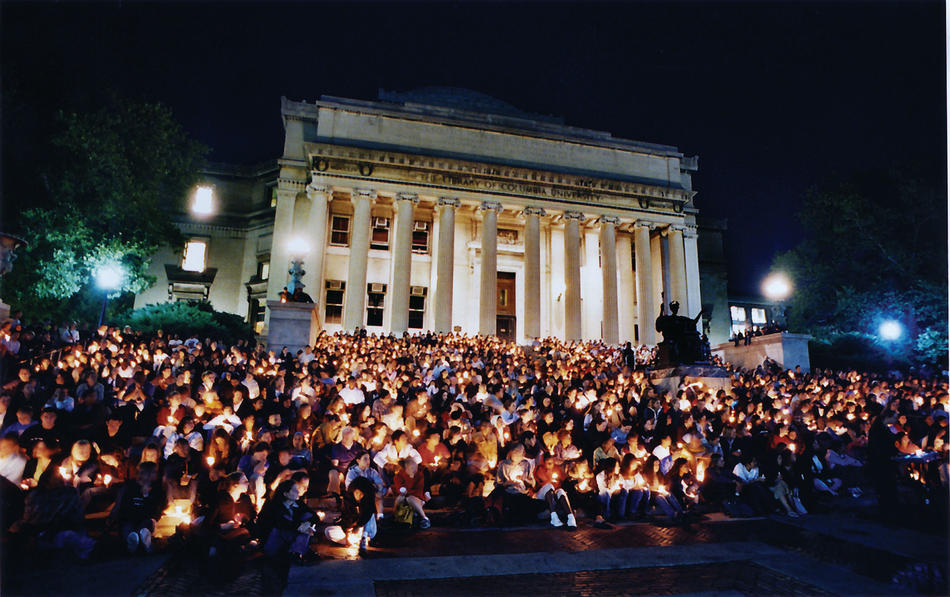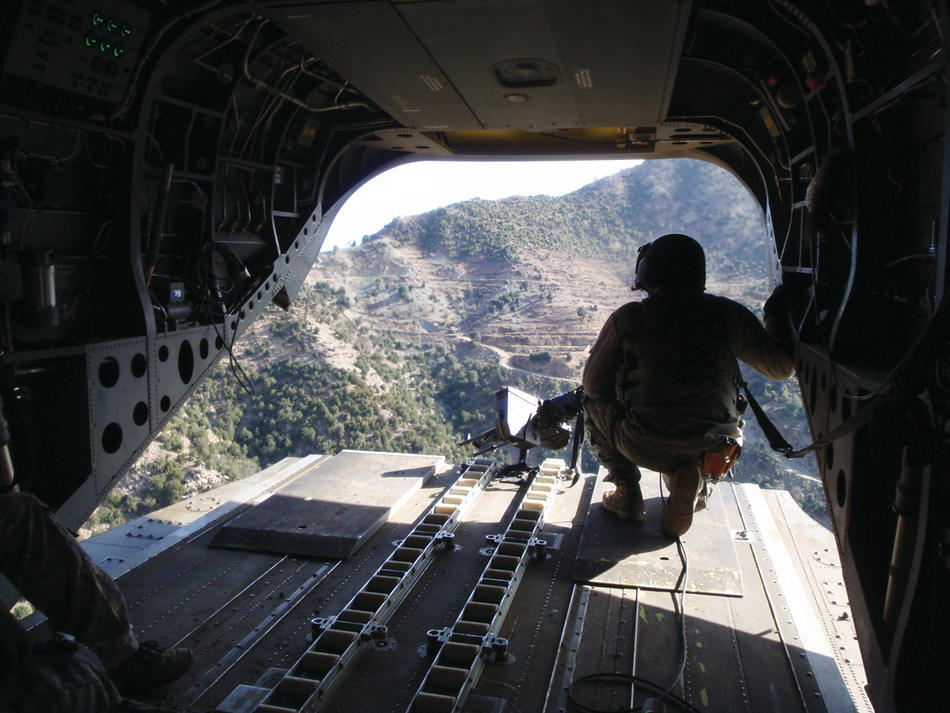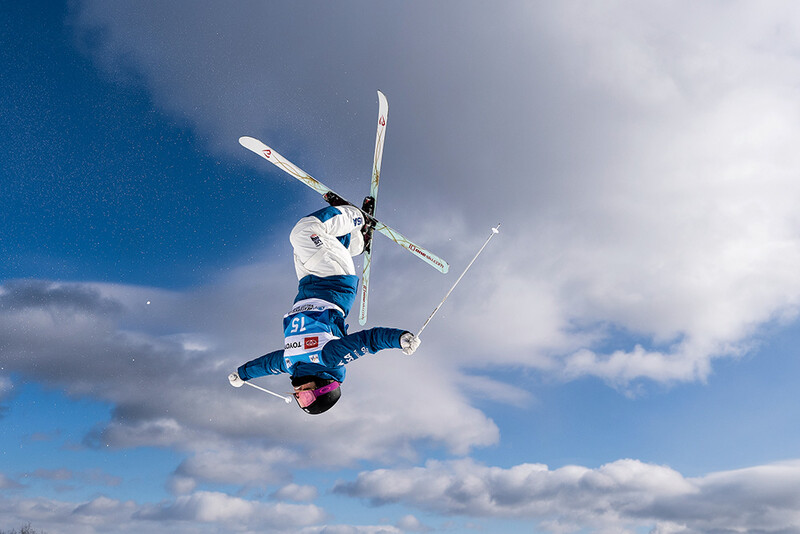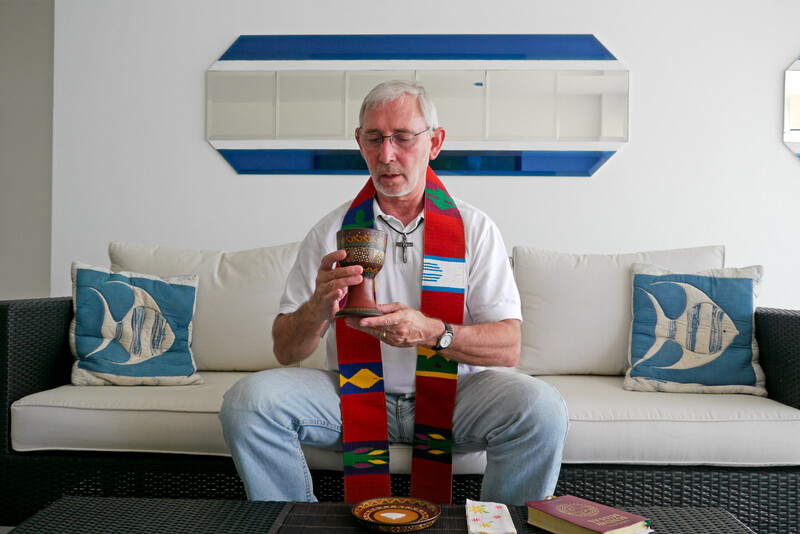It’s 100 degrees in Pentagon City, a boxy development of midrise residential and commercial buildings half a mile south of its polygonal namesake. The salient condition here is that of sterile, blazing concrete, a white-desert hue a few shades rougher than the polished sandstone and marble across the Potomac. From this terrain of baked cement a man materializes. He wears cream chinos, a yellow-checkered shirt, and a pair of Oakley sunglasses. Lt. Col. Jason Dempsey ’08GSAS, who is in Washington apartment hunting, advances through the heat toward the shelter of the Ritz-Carlton.
He enters the air-conditioning of the hotel lounge, removes his Oakleys, settles into a chair, and orders a double espresso. Dempsey is a prolific talker, genial, straight-shooting, two-fisted, equal parts West Point and West 116: an academic ingrained in civil-military theory, a soldier-scholar who directed operations for an infantry battalion in the mountains of eastern Afghanistan, a current White House Fellow posted in the Office of the First Lady, and a meticulous political scientist whose recent book, Our Army: Soldiers, Politics, and American Civil-Military Relations, includes the first-ever random-sample survey of the political attitudes of enlisted soldiers.
And now, in this interview-friendly lounge, where Tripp had tea with Lewinsky while wearing a body microphone — good acoustics here — Dempsey will talk about the Army, Our Army, politics, Columbia, and his year on the Afghan-Pakistani border. He’ll talk about anything except for his former boss, the retired general Stanley McChrystal, who talked too much to Rolling Stone. There is still such a thing as protocol.
The Paradox of Prestige
“He explicitly traded upon his identity as a soldier to say, ‘I endorse this guy for president.’ That’s horrible, that’s well beyond the pale.” Jason Dempsey, knees apart, neck muscles working, sets his espresso cup down on its white saucer. “That’s a retired officer selling the reputation of the entire force for political purposes.”
Dempsey is talking about Tommy Franks, the retired four-star general and vanquisher of Saddam Hussein who stood before the 2004 Republican National Convention in Madison Square Garden in a dark suit and red tie, and against a backdrop of billowing images hinting of helmets, flags, and heavenly rays, endorsed George W. Bush for president. If there had been a notion out there that the military and the Republican Party were sharing a tent, Franks’s emotional speech in New York might have seemed like fulfillment.
“If you retire as a general, I’d like to see you keep your mouth shut for four years,” says Dempsey, who is 38. “You have to be cognizant and mature enough to understand that candidates aren’t asking for your endorsement because you’ve articulated grand ideological positions. They’re coming to you solely because they know the military is respected, and they want some of that respect. So when you agree to give that endorsement, you are explicitly trading on a commodity that isn’t yours to sell.”
It’s what Dempsey calls the “paradox of prestige”: Since the military remains the most trusted and esteemed of public institutions — in part, Dempsey argues, because of its traditional code of nonpartisanship — “political actors will consistently try to get a piece of that prestige. What the Army needs to remember is that once you sell it, it’s gone.”
It was in those high-pitched days in the spring and summer of 2004, when “swiftboat” became a verb and veterans were in the thick of the election battle, that Dempsey mailed an 81-point multiple-choice questionnaire to randomly chosen soldiers, resulting in a sample size of 1188. “There had been some decent academic studies, but they were focused on the senior officers,” says Dempsey. “And that’s where people got their opinions about the military. Senior officers make up just 6 percent of the Army, but the public ascribes their views to the entire force.”
Although in 2004 the majority of senior officers identified as Republicans (61 percent, according to a Military Times poll, with 20 percent Independents and 13 percent Democrats), it remained to be seen if their political opinions had in fact trickled down to the rank and file. Dempsey wanted to know: How did soldiers feel about the political and social issues of the day? Without referring to the topics by their hot-button names, he inquired into soldiers’ thoughts on affirmative action, health care, capital punishment, the environment, religion, race relations. He asked them about their ethnicity, income, education level, why they joined up, and what they believed should be the proper purpose of the military. Was it to fight and win wars? To assist in disasters? To build institutions in war-torn places?
Dempsey wasn’t permitted to ask directly about party affiliation, but the answers to his questions would tell him what he wanted to know, with a great degree of certainty.
Narrowing the Field?
Dempsey first thought of doing a survey in early 2002, as a Columbia PhD candidate in search of a dissertation topic. With the nation engulfed in 9/11 patriotism, fear, and paranoia, and soldiers on the ground in Afghanistan, the military was at the center of the national debate. “I started thinking that a study of social attitudes in the Army was needed, because there was a perception that the Army was overwhelmingly Republican, that we were hyperpolitical and voting at astronomical rates. So I said, ‘Well, here’s an opportunity,’ and really what I mean is an obligation. I was in a special position. I was given the tools by Columbia and by the Army to look at something that was central to the military’s relationship with society.”
Working under professor Robert Shapiro of the political science department, Dempsey navigated the Army bureaucracy to gain access to the airtight Army database, from which he drew his pool of respondents. His own experience on military bases told him that politics didn’t come up much in day-to-day Army business, and that election days weren’t the Super Bowl. “Come an election, you might be out training, or in the field, nowhere near a polling place, and nobody would blink an eye,” he says. “The idea that the Army was voting at high rates simply wasn’t accurate.”
Still, overt party identification among the top brass might have its own unintended effects. “Say you’re considering becoming an Army officer,” Dempsey says. “That’s four years at West Point, five years of active-duty time, and three years as a reservist. So you think, ‘I’m going to spend 12 years at this institution, and everyone here seems to be Republican. Hmmm.’ If you’re indifferent, you’ll just think, ‘I guess I should be a Republican.’ A lot of cadets come in and haven’t decided yet, but they assume they’re going to become Republicans by virtue of being at West Point.
“Then other people might ask, ‘Well, if I join the Army, would I be endorsing a specific foreign-policy agenda?’ If that becomes the perception, then we’re narrowing the field of possible applicants. That would not be in the Army’s interest — or the nation’s.”
An Element of Danger
The first time Jason Dempsey got punched in the face was in the gym at West Point. Actually, the first time was in second grade, after which he avoided physical conflict save for wrestling in high school. He was small as a kid and didn’t break 100 pounds until 11th grade. But at West Point, everyone is required to take a quarter semester of boxing, and Dempsey, who has a sharp, slender nose and a chin like the butt of a rifle, threw himself into it. “One of the biggest lessons for a young officer is to go in the boxing ring and get punched in the face,” he says. “People don’t have a lot of experience of personal violence. I boxed to scare the hell out of myself. I did not like getting hit in the head.”
He coached an intramural team at the Academy, boxed with guys who had come up from Fordham and other schools. In his last match he got his nose broken, but kept going and won the fight, finishing his senior year 4–0. He credits the sport with helping him develop physical and mental courage.
“Boxing has a very real element of danger, and requires control, which is very much like life in the Army. It’s about keeping your cool.”
That would come in handy soon enough.
Culture Shock
Dempsey has a deep voice and speaks with a raspy drawl that belongs more to the military than to a specific region, an intonation that seems to have been formed within the scratchy frequencies of a two-way radio. He grew up on Army bases in the U.S., West Germany, and South Korea. His father, Jack, was an Army officer who did ROTC at the University of Idaho. When Dempsey was 14, Jack took a job with the National Guard, and the family moved to Jefferson City, Missouri. For the first time, Jason was in a fully civilian environment. He attended a public high school, where he saw racial conflict that was foreign to his experience on the base. “Overall,” he says, “it felt like I’d been transported back to the 1950s,” and not in a Howdy Doody kind of way. He took up wrestling and wondered how he’d pay for college. Maybe he’d do ROTC, like his dad.
One day in English class, a friend said that a recruiter from West Point was down in the office. Dempsey, happy to get out of class, went to check it out. West Point had never really occurred to him. His conception of military academies owed much to the 1981 movie Taps, which climaxes in a fatal shoot-out between cadets and National Guardsmen. The recruiter then gave him a brochure claiming that the typical incoming class at West Point was chockfull of varsity lettermen, academic hotshots, and class presidents. That sounded good to Dempsey. Those were his kind of people. West Point it was.
He found the Academy tough at first — he wasn’t used to having every minute of his day accounted for. But by his third year he’d developed a real attachment to the place, and even began to look forward to returning there after weekends away. This was in the early 1990s, when many senior officers had already become overtly partisan. Contempt for Bill Clinton, who hadn’t served in Vietnam, was the logical extension of a pro-Republican trend that began in the Carter years, took off during the Reagan defense buildup, continued through the morale-boosting Gulf War under Bush One, and nearly burst its seams when Clinton implemented “Don’t Ask, Don’t Tell” in 1993.
Dempsey graduated in ’93 with a degree in political science, and began his military career at Fort Bragg, in the 82nd Airborne Division, as a platoon leader. Then he went to Fort Lewis, Washington, to serve in the 2nd Ranger Battalion, and after that, spent a year with the Marines at Quantico, Virginia. Then it was south to Fort Stewart, Georgia, where he was company commander in the 3rd Infantry Division. As he finished up his command, he applied to teach at his alma mater. West Point accepted him, but first he would have to go away for a couple of years, on the Army’s dime, and get his advanced degree.
Dempsey now had to choose a graduate school. One of his political science instructors at West Point was Col. Jay Parker ’91GSAS, and one of his West Point classmates, Craig Cummings ’05GSAS, was already at Columbia getting his doctorate. Cummings praised the program to Dempsey and encouraged him to apply.
Fighting Words
Columbia, contrary to its post-1968 antimilitary reputation, enjoyed real distinction in the field of civil-military relations. No less a figure than Samuel Huntington had taught there in the early 1960s. It was Huntington who, in 1957, at the age of 29, published The Soldier and the State, a foundational text of civil-military theory. Huntington also served as associate director of the Institute of War and Peace Studies at Columbia, created in 1951 under University president Dwight D. Eisenhower, to promote an understanding, in the retired five-star general’s words, of the “disastrous consequences of war upon man’s spiritual, intellectual, and material progress.” The institute, which has since become one of the elite research centers in the country for the study of international relations, was renamed the Arnold A. Saltzman Institute of War and Peace Studies in 2003, and is currently directed by Richard K. Betts, who studied with Huntington at Harvard.
In August 2001, Dempsey arrived at Columbia, bought a Colnago racing bike, and began his studies in the political science department. On the morning of September 11, when he heard what was happening, he hopped on his bike and raced down the West Side Highway to see if there was anything he could do to help. What he saw was a mile of ambulances parked along the highway, and emergency workers standing around with nothing to do. That image would stay with him. Being the kind of person who, if he can’t be of any use has no need to stick around, Dempsey pedaled back to campus. The world had changed, and the future was anyone’s guess. Still, if you had told him then that eight years hence he’d be in the mountains of Afghanistan trying to interdict the Taliban along the Pakistani border while investigating the smuggling operations of the local timber mafia, he might have looked at you funny. But Dempsey heard plenty of other strange things after September 11. Morningside Heights provided good grist for an Army guy interested in political behavior.
“The post-9/11 environment at Columbia was — well, surreal is an overused word. Certainly it was very sober. People were quiet, no matter their politics. Everybody was in shock. But then people were digging up posters from the Vietnam era, and that was what was going up on the walls of Columbia. Pictures of Vietnamese children and quotes from Martin Luther King. That was the frame of reference, which apparently was 1972. So whether people were anti- or pro-war, it was hard to take them seriously. It was as if they said, ‘Here’s the position I’ve heard I should be taking given my current politics.’ And I thought, ‘Really? That’s as far as we’ve come?’”
It was in this ambience that Dempsey set to work on what would become the 2004 Citizenship and Service Survey. Along the way, he had some face-to-face encounters that told him additional things about military viewpoints. Once, at a seminar at Syracuse University, he spoke to a group of senior officers who were about to be promoted. The topic was Latino integration in the military.
“I came in and talked to them about the challenges inherent in a system where all of our senior officers are white, and how this affects our relationship with society. And this Navy captain, soon to be an admiral, got up and said, ‘I don’t understand why I need to care about this stuff, I just drive the ship.’ I just drive the ship. I thought, ‘Here’s a guy about to become a senior leader in the Navy, and he’s convinced that he doesn’t have to think about how we relate to the American public. In fact, he’s offended somebody would be wasting his time talking about it.”
For remedy, Dempsey calls for more emphasis on civil-military relations in the military education system. “There’s never any substantive debate about our interaction with politics,” he says. “What happened, particularly in the ’90s, was that in trying to commit people to the cause of service, we pumped them up and said, ‘You’re special, you’re doing great things, your country loves you, everybody loves you.’ But we never said, ‘We love you because you’re a servant.’ We never asked what being a servant means. So young officers thought, ‘I’m in the military, the military is respected, therefore I have a privileged place in society. I should be able to expound my views, lecture the American people on what to do, and tell the media when they’re wrong.’
“We’ve patted ourselves on the back so much that we destroyed the very idea of service. In our effort to rehabilitate the image of the military from the Vietnam era, we put our military on a pedestal, when really, it’s the military that should be at the feet of the public.”
Issues with Uncle Sam
Samuel Huntington, best known for his 1996 book The Clash of Civilizations and the Remaking of World Order, drew a line in the sand in 1957 between the military and the public. The Soldier and the State is full of powerful articulations of what Huntington saw as the inherent conflict between the traditional American ideology of liberalism and the military ethic. Liberalism, with its general pacifism and emphasis on the primacy of the individual, “does not understand and is hostile to military institutions and the military function,” while the military, with its “recognition of the role of power in human relations, its acceptance of existing institutions, its limited goals, and its distrust of grand designs,” is at one with Burkean conservatism.
Dempsey, ever suspicious of generalities and assumptions, takes time in Our Army to punch holes in Huntington’s theory of a rigid ideological divide. “The military comes from civil society, and ultimately returns to civil society,” he says. “We’re one and the same.” And he worries that Huntington’s paean to the military academy, when read out of context by cadets, could perpetuate a false impression.
“At the end of The Soldier and the State, Huntington romanticizes and idealizes West Point to an almost irresponsible degree,” Dempsey says. “Clearly, here’s a young guy in the early years of the Cold War, and he’s desperately fearful of the chances for liberal democracy to survive the communist juggernaut. He goes up to West Point, and says, ‘Aha! This is what’ll save us. This ordered serenity, this nice hierarchy, the church on the hill. This is what America should emulate.’ He presents a ridiculous portrait that isn’t grounded in reality.”
Dempsey is proud of his service, and appreciates the respect and the gratitude that the military often receives. It just makes him nervous when folks get carried away.
Plz Adjust Your Fire. Thanx.
“Our base camp was about six or seven kilometers from the Pakistani border, which is conveniently in range of a 107mm Chinese rocket. The rockets are ubiquitous, insanely cheap, and you don’t need a tube to launch them. You can take one, eyeball it, set it on a rock, light a fuse, and launch it toward our camp. So we kept getting these rockets. You know it when you’re hit by a rocket, but it’s not always easy to determine the launch site. Oftentimes, you have to run out and look at the hole in the ground, and at how the dirt sprays, and then you can figure out on the map where they’re coming from. So after getting a couple dozen rocket attacks, we had a pretty good idea.”
Dempsey spent 2009 in eastern Afghanistan with the 10th Mountain Division, serving as operations officer of a battalion, and then a brigade. The first half of his tour was spent at a remote base in Kunar Province. That area includes the Korengal Valley, a sparsely populated gorge near the Pakistani border, walled by steep, wooded, almost impassable mountains, and known by American soldiers as the “Valley of Death.” Dempsey’s battalion, the first significantly sized force placed directly on the border with Pakistan, sought to stem the flow of hostiles into the Korengal and relieve the pressure on the troops there. Part of this was to be done through counterinsurgency, which Dempsey described in an article this summer in Foreign Policy as a “mundane and exceptionally time-consuming” business: “The life of a company commander in Afghanistan quickly takes on a routine of daily meetings with powerbrokers and tours through villages to assess development projects, visit schools, and connect with local people,” he wrote. “Incoming soldiers are told what to expect, but the true complexity of the task often doesn’t sink in until they arrive.” He argues that U.S. strategy must acknowledge the limitations of what the military can accomplish on its own in such a multilayered and unfamiliar culture.
In addition to trying to extend the reach of the Afghan government (“I won’t comment on Karzai,” Dempsey says through his jaw. “That’s above my pay grade”), the mission of Dempsey’s battalion was to interdict insurgent movement across the border.
“We really didn’t know what that looked like. Are they coming over in caravans? Are there big shipments? What does it mean to interdict? One thing we did know is that there’s a lot of wood smuggling going on, and that there are rumors that everybody’s involved with it.” Dempsey tends to move to the present tense when discussing such things. “We haven’t figured out how the insurgents are coming back and forth, we don’t know much about the local economy, we aren’t sure who in the government is corrupt or not corrupt. But we do know about the wood.”
The wood was a high-quality variant of cedar that was being cut down illegally and spirited into Pakistan, where it was made into furniture. “So our idea was, let’s try to track the wood, because it would tell us how people are getting across the border. It’s harder to track a guy who might be carrying a rifle, but you can track a giant truckload of logs.”
The job was complicated by hair-trigger tensions between the Pakistani border patrol and Afghan soldiers, which the Americans often had to mediate. And then there were those rockets that kept crashing down around Camp Joyce.
“One day we get a hit on the radar that’s sufficient enough to fire counterfire immediately, because we know exactly where the rocket came from. We’re shooting our mortars back at the border, at this launch point, trying to get the guys who just fired their rocket. We’d established some communication channels with the Pakistani border patrol, and I get this text message from a Pakistani guy that says, ‘Hey, please adjust your fire, you’re firing within 200 meters of our border post.’ It’s a hilarious message, because it says ‘plz’ instead of ‘please,’ and at the end it says ‘thanx.’ I’m thinking, ‘It’s a crazy war.’
“I also think, ‘Screw them,’ because the rockets appear to be fired from a place they should have been easily able to see from their border post. We adjust our fire and move away from them, but my initial impulse is that they had to have seen it. Finally, we get helicopters so we can fly up to the Pakistani border post, and on the way we see some guys coming down on the Afghan side. We’re wondering who the hell they are, wondering whether to shoot them or not, and we hold our fire because we realize it’s Pakistani guys on this side of the border. So we get to the border post and we say, ‘How come you’ve got a patrol on the Afghan side there?’ ‘Oh, well, that’s where we get our water; we go down to the well on the Afghan side, because if we go on the Pakistani side, they’ll kill us.’” They being the Taliban. “We also realized that someone could easily be firing rockets from 200 or 300 meters down without the border patrol being able to do anything about it — the terrain is so insanely difficult.”
Such was life on the Durand Line in A.D. 2009.
As for the wood, Dempsey’s team eventually made a discovery: enormous piles of lumber on the other side of the Pakistani border post, all bundled and ready to be picked up. “So we’re sitting up at the border, looking at all these piles of wood on the Pakistani side, and then a donkey train that we’d seen earlier but lost track of is all of a sudden coming right toward us. I thought: ‘Are you kidding me?’ And it’s a group of kids, teenagers, pulling this wood up, and they say, ‘Hey, how’s it going?’ They don’t even know that what they’re doing is illegal, because it’s what everybody in the valley does. We’re talking to them, and they tell us the name of the guy who pays them. Wait a minute: We know that that guy also harbors insurgents who travel in and out.
“So by pulling on the thread of the lumber trade, we found out where the border police weren’t effective, where government people were being paid off, and where local warlords were able to push local government officials to look the other way.”
The Sniff Test
“One way we in the military tend to approach these wars is with a sniff test: ‘Is this in and of itself a decent thing to be doing? Are we making somebody’s life better?’” Dempsey pauses for a sip of espresso. “We can argue all day about how these wars fit into the grand scheme of American power and international relations. But from the Army perspective, it’s always, ‘Can we make a difference in the lives of the folks there, or are we wasting our time?’ From my perspective, I think we can make progress, and do good. Now, whether or not it fits our national interests appropriately, or can be done in a timely or cost-effective manner, that’s for somebody else to decide.
“We can do what the American public asks. We just ask the American public to understand that there are limitations to what we can do. We can run around the hills and kill known insurgents nonstop, but if there’s not good governance, if we’re not giving an economic alternative, we’re wasting our time, because more insurgents will pop up to replace them, and there’ll be second-order effects that would negate any progress. So we know we have to pursue all these efforts in concert, in a way that gives more steps forward than steps back.
“A year ago the president announced that we were going to send 30,000 additional troops to Afghanistan. Those troops are just now getting there. Only now are the right systems arriving with the people. But because we talked about those 30,000 a year ago, there might be a public perception that they’re already in place. ‘They’ve been there for a year, why haven’t they done anything?’ But we just got there.”
You and Whose Army?
Dempsey was in Afghanistan while he revised Our Army, communicating by e-mail with Robert Shapiro back at Columbia. Contrary to those anxious early-2000s visions, the results of the Citizenship and Service Survey of 2004 revealed an army that was hardly in political lockstep. Dempsey’s research confirmed the conventional wisdom about officer attitudes, but found that overall the Army looked a lot like the American public: 32 percent of enlisted soldiers identified as conservative, compared to 37 percent in the public, and 23 percent identified as liberal, nearly identical to the 24 percent among civilians. If anything, soldiers voted at lower rates, and were, on the whole, less politically engaged than their civilian peers. The real change, it turned out, was occurring in the upper echelons: When Dempsey presented his data to senior officers in 2006, he was told that the mind-set of the senior ranks was shifting significantly. With things gone south in Iraq, officers were reporting a growing disillusionment with the leadership in Washington.
Dempsey measured this new skepticism. He got hold of the past few surveys that the Military Times distributes yearly to its subscribers, separated out the senior officers from retirees and junior officers, and weighted them so that they were reflective of the entire senior officer population. Using this technique, he found that between 2004 and 2008, there was a 13 percent decrease in the number of self-identified Republicans among senior officers.
“That’s the inverse of what we saw during the Carter administration,” Dempsey says. “Bush had the same effect as Carter, but in the opposite direction. Then the question becomes, ‘Where’s the military going?’ Because that 13 percent who no longer identified as Republicans didn’t necessarily become Democrats.
“The best-case scenario is that we’re becoming nonpartisan — that we understand it’s in everyone’s long-term interest that we’re not affiliated with either party.” And the worst-case scenario? “That those people went into an antipolitical stance, one that says, ‘Screw ’em all.’ It means that we disdain politics as being beneath the military. This, too, subverts the idea of service — the notion that we know what’s best for our country. Well, no, we don’t, and it’s not our job to know what’s best for the country.”
Dempsey has arrived at the dregs of his espresso. He knocks back what’s left and wipes his mouth with his cloth napkin.
“The Army’s really in flux right now,” he says. “Our approach to war is changing, our approach to politics is changing. It’s a much more reflective moment.”
Winging It
In June, Dempsey was named a White House Fellow, one of 13 people chosen out of more than 700 applicants to take part in the program, which was created by President Lyndon B. Johnson in 1964 to provide young leaders with hands-on experience at the top levels of government. Dempsey, who is married with two young children, will spend the next year working in the East Wing of the White House, where he hopes to contribute to Michelle Obama’s outreach initiative to military families.
Having approached policy from its opposite ends — the theoretical side at West Point and Columbia, and the implementation side in Afghanistan and Iraq (in 2005, he was deployed to Iraq to help coordinate strategy in the restive Kurdish north), Dempsey will now use the fellowship’s educational program to explore what he calls “the messy middle,” that sector inside the Beltway where theory is translated into process, and where the Army’s future will be largely determined.
“The policy challenges are going to be unbelievable,” Dempsey says. “Just taking care of the veterans from these two conflicts is going to place tremendous strains on our national budget. Then there’s refitting all the Army’s worn and broken equipment and deciding what we’ll need once this war’s over, and having no idea what new enemies will pop up, or where we’ll go. The White House Fellowship is a unique opportunity to acquire a new skill set to help the Army prepare for an uncertain future.”
But Dempsey won’t be sticking around Washington for long — at least not this time. When the fellowship ends next September, he’ll pack off for another tour to Afghanistan, where he’ll command an embedded training team for the Afghan army. The team will advise and instruct the Afghans, and even accompany them on missions.
“We don’t have much of a playbook for that,” Dempsey says of the assignment. With his mix of can-do enthusiasm and hard-nosed pragmatism he might be talking about a tricky new research project (the 2004 Citizenship and Service Survey had no real playbook, either), or budget issues facing the military, rather than another year in a war zone. “It should,” he says steadily, “be a fun challenge.”
